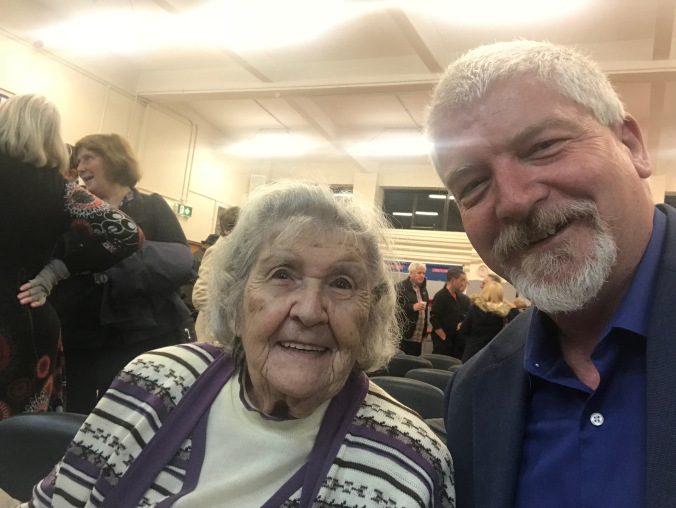As a young boy, I remember my grandfather talking to me about serving as a soldier in World War I. Later in life, I often wished that I had listened more carefully, had asked him more questions. Today, no-one can hear such stories from a first-hand witness. The last World War I veteran died over 6 years ago.
Last night, along with a room full of other enthralled visitors, I had the opportunity to hear a voice from another vanishing generation share her personal experience of a significant time in history. And her voice is one that is needed more now than ever before. We live in an age when nationalism and populism are once again rearing their ugly heads. Fear of immigrants and foreigners is being used as a political tool to panic and influence referendums and elections. Acts of ethnic violence, and anti-semitism, are on the increase. And, most tragically, sections of the the church of Jesus Christ, instead of standing out as a voice of love and reason, seem to be part of the problem rather than part of the solution.

So that’s why I felt that it was so important to take the opportunity to meet Judith Rosenzweig and hear her story. Judith is part of a generation that was betrayed by the Church. Growing up as a Jew in 1930s Czechoslovakia, the large numbers of Christians in neighbouring Germany should have been a source of love, protection and light. But we know that the Church, with a few heroic exceptions, failed Judith. Large numbers of professing Christians swallowed the national socialist lie that making Germany great again must involve military aggression, stoking hatred against other religions, and fearing those who were different.
After the Nazis invaded Czechoslovakia, Judith and her family were incarcerated in Theresienstadt concentration camp when she was 12 years old. Then, in 1944, they were transferred to Auschwitz, where she managed to avoid the gas chambers by being young and strong enough to work as a slave labourer.
In January 1945, as Russian forces advanced towards Auschwitz, Himmler ordered the SS to force 68,000 prisoners to march from Auschwitz to Germany. Judith was part of the notorious Auschwitz to Bergen-Belsen Death March, where poorly nourished prisoners with no winter clothing were forced to walk 780km in the depths of winter. Hundreds collapsed on the way and were shot where they lay.
Later that year, Bergen-Belsen was liberated by British troops who tried to save the lives of the starving inmates by sharing their rations with them. Judith’s mother was given some soup, but the shock to her system of eating food after so many months of starvation actually killed her. Judith and her sister survived. Eventually, despairing of Europe ever being a place where she could live in peace and security, she emigrated to Israel. Today Judith lives in a home for Holocaust survivors in Haifa, provided by a Christian ministry.
What struck me in Judith’s story was her lack of self-pity, and the total absence of any bitterness or anger towards others. At several points in her story, she paused to express her wish for peace and harmony among various nationalities and peoples. Judith is not a Christian, but we have much to learn from her attitude, particularly at a time when some professing Christians are quick to spread fear and anger, or to quickly jump to criticising and attacking those with whom we disagree.
I spoke with Judith, explained my role as Executive Director of Evangelical Alliance Ireland, and assured her, in the light of the terrible recent hate attack against a synagogue in Pittsburg, that many evangelical Christians were praying for the Jewish people.
Judith is 88 years old. As time and age advances, the opportunities to hear first-hand voices such as hers will become less and less. But how we need to hear such voices!





